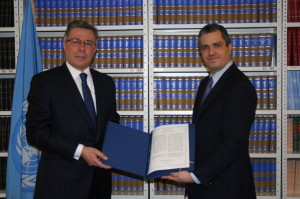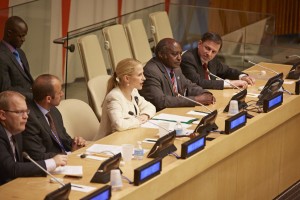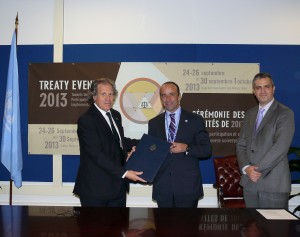

Our purpose: Promoting peace through criminal justice – preventing crimes of aggression
Through the United Nations Charter, States have expressed their commitment “to save succeeding generations from the scourge of war”. They have agreed to renounce the illegal threat or use of force, and to settle their disputes “by peaceful means in such a manner that international peace and security, and justice, are not endangered”. States have the legal duty to abide by this commitment and the UN Security Council has the primary responsibility to enforce it.The Nuremberg Trials made it clear that criminal justice also has an important role to play for the promotion of peace and the deterrence of acts of aggression – though it remained limited and theoretical for many decades thereafter. With the 2010 Kampala amendments to the Rome Statute of the International Criminal Court, States Parties created a new mechanism to enforce the most important rule of international law: the prohibition of the illegal use of force under the United Nations Charter. This website is dedicated to making accountability a reality.
News
 Promoting universality of the Rome Statute and the Kampala Amendments in the Pacific Region: On 6 and 7 March, New Zealand, Liechtenstein and the Global Institute for the Prevention of Aggression will be hosting a workshop on the universality of the Rome Statute and the Kampala Amendments in the Pacific Region. At the present, only 8 of the 16 members of the Pacific Island Forum have ratified the Rome Statute. The aim of the workshop is the encourage ratification of the Rome Statute and the Kampala amendments and to inform States of the resources that States can draw upon to support them in their ratification processes. For more information, see upcoming events.
Promoting universality of the Rome Statute and the Kampala Amendments in the Pacific Region: On 6 and 7 March, New Zealand, Liechtenstein and the Global Institute for the Prevention of Aggression will be hosting a workshop on the universality of the Rome Statute and the Kampala Amendments in the Pacific Region. At the present, only 8 of the 16 members of the Pacific Island Forum have ratified the Rome Statute. The aim of the workshop is the encourage ratification of the Rome Statute and the Kampala amendments and to inform States of the resources that States can draw upon to support them in their ratification processes. For more information, see upcoming events.
Media representatives are invited to a press conference on 5 March. They are further invited to direct any enquiries to Bettina Ambach (Bettina@bettinaambach.de).
Picture Credit: Central Intelligence Agency
 Austrian government approves Kampala Amendments: On 29 January, the Council of Ministers of Austria approved the ratification of the Kampala Amendments (see the agenda of the Council of Ministers Session, in German). These were subsequently forwarded to parliament for adoption (see the ratification documents before parliament, in German). There are currently 13 States Parties to the Kampala Amendments on the Crime of Aggression. To date, seven Member States of the European Union have ratified the amendments.
Austrian government approves Kampala Amendments: On 29 January, the Council of Ministers of Austria approved the ratification of the Kampala Amendments (see the agenda of the Council of Ministers Session, in German). These were subsequently forwarded to parliament for adoption (see the ratification documents before parliament, in German). There are currently 13 States Parties to the Kampala Amendments on the Crime of Aggression. To date, seven Member States of the European Union have ratified the amendments.
 Government of Slovakia approves Kampala Amendments: On 15 January 2014, the Kampala Amendments to the Rome Statute were approved by the government of Slovakia. The amendments will now be examined by parliament, subject to final ratification by the president. Currently, 13 States Parties have ratified the Kampala Amendments on to the crime of aggression as well as those on article 8 (war crimes). There has been strong interest in the crime of aggression amendments in Eastern Europe, with three States having ratified so far.
Government of Slovakia approves Kampala Amendments: On 15 January 2014, the Kampala Amendments to the Rome Statute were approved by the government of Slovakia. The amendments will now be examined by parliament, subject to final ratification by the president. Currently, 13 States Parties have ratified the Kampala Amendments on to the crime of aggression as well as those on article 8 (war crimes). There has been strong interest in the crime of aggression amendments in Eastern Europe, with three States having ratified so far.
 Croatia ratifies crime of aggression amendments: On 20 December, Croatia deposited its instrument of ratification of the Kampala amendments with the Office of Legal Affairs of the United Nations. Like 12 other States before it, Croatia chose to ratify both sets of Kampala amendments – pertaining to war crimes and the crime of aggression – simultaneously. It had already implemented the amendments into its domestic law earlier this year. Croatia is the 10th State to ratify the amendments in 2013, the third Eastern European State to do so, and will be the 13th State Party to the crime of aggression amendments. The Kampala amendments for the crime of aggression will, once activated, allow the International Criminal Court to prosecute individuals for the most severe form of the illegal use of force. They are complementary to the prohibition on the use of force enshrined in the UN Charter.
Croatia ratifies crime of aggression amendments: On 20 December, Croatia deposited its instrument of ratification of the Kampala amendments with the Office of Legal Affairs of the United Nations. Like 12 other States before it, Croatia chose to ratify both sets of Kampala amendments – pertaining to war crimes and the crime of aggression – simultaneously. It had already implemented the amendments into its domestic law earlier this year. Croatia is the 10th State to ratify the amendments in 2013, the third Eastern European State to do so, and will be the 13th State Party to the crime of aggression amendments. The Kampala amendments for the crime of aggression will, once activated, allow the International Criminal Court to prosecute individuals for the most severe form of the illegal use of force. They are complementary to the prohibition on the use of force enshrined in the UN Charter.
Photo © Mission of Croatia to the UN /Zoran Joković
 Belgium ratifies crime of aggression amendments: On 26 November 2013, Belgium deposited its instrument of ratification of the Kampala amendments with the Office of Legal Affairs of the United Nations. Belgium will become the 12th State Party to the crime of aggression amendments. Belgium took a leading role in the Kampala Review conference, as the main sponsor of the amendments to article 8 of the Rome Statute, which area also known as the Belgian amendments. These further align provisions relating to weapons, the use of which constitute war crimes, between non-international and international armed conflict. Like 11 other States Parties before it, Belgium chose to ratify both sets of amendments at the same time. Upon activation of the aggression amendments in 2017, the ICC will be the first international court since the International Military Tribunals in Nuremberg and Tokyo to hold individuals responsible for the crime of aggression.
Belgium ratifies crime of aggression amendments: On 26 November 2013, Belgium deposited its instrument of ratification of the Kampala amendments with the Office of Legal Affairs of the United Nations. Belgium will become the 12th State Party to the crime of aggression amendments. Belgium took a leading role in the Kampala Review conference, as the main sponsor of the amendments to article 8 of the Rome Statute, which area also known as the Belgian amendments. These further align provisions relating to weapons, the use of which constitute war crimes, between non-international and international armed conflict. Like 11 other States Parties before it, Belgium chose to ratify both sets of amendments at the same time. Upon activation of the aggression amendments in 2017, the ICC will be the first international court since the International Military Tribunals in Nuremberg and Tokyo to hold individuals responsible for the crime of aggression.
 Support for crime of aggression at Assembly of ICC States Parties: At the annual meeting of the Assembly of States Parties to the Rome Statute of the International Court, many States Parties took the floor during the General Debate to speak about the Kampala Amendments. 12 States Parties made a positive mention of the crime of aggression amendments. Many, including Botswana and Germany, called for others to ratify, so as to ensure that the amendments could be activated in 2017. Others updated on their domestic ratification procedures. Croatia and Belgium announced that both Kampala amendments had received parliamentary approval, and that they hoped to deposit their instruments of ratification before the end of the year. Delegates will have a chance to benefit from the experience of the early ratifiers of the Kampala Amendments at a side event organised by the Global Institute for the Prevention of Aggression and Liechtenstein.
Support for crime of aggression at Assembly of ICC States Parties: At the annual meeting of the Assembly of States Parties to the Rome Statute of the International Court, many States Parties took the floor during the General Debate to speak about the Kampala Amendments. 12 States Parties made a positive mention of the crime of aggression amendments. Many, including Botswana and Germany, called for others to ratify, so as to ensure that the amendments could be activated in 2017. Others updated on their domestic ratification procedures. Croatia and Belgium announced that both Kampala amendments had received parliamentary approval, and that they hoped to deposit their instruments of ratification before the end of the year. Delegates will have a chance to benefit from the experience of the early ratifiers of the Kampala Amendments at a side event organised by the Global Institute for the Prevention of Aggression and Liechtenstein.
Photo © CICC/ Katharina Tjart
 UN Secretary-General calls on States to ratify Kampala Amendments: In his message to a side-event organized by the Global Campaign on 27 September, UN Secretary-General Ban-Ki Moon called on States to follow the lead of those that had already ratified the amendments. He stated that “Kampala completed the work of Rome. Just as important, it also completed the work of San Francisco more than 65 years ago.” The message was delivered by the UN Legal Counsel, Mr. Miguel de Serpa Soares. On the podium, the Foreign Ministers of Botswana, Estonia and Liechtenstein, as well as the Vice Foreign Minister of Argentina echoed that message. 19 States took the floor in the ensuing debate to update on the status of ratification in their own country, to underscore the importance of the amendments, and to call upon others to ratify. For more information, please see the past events section on our website.
UN Secretary-General calls on States to ratify Kampala Amendments: In his message to a side-event organized by the Global Campaign on 27 September, UN Secretary-General Ban-Ki Moon called on States to follow the lead of those that had already ratified the amendments. He stated that “Kampala completed the work of Rome. Just as important, it also completed the work of San Francisco more than 65 years ago.” The message was delivered by the UN Legal Counsel, Mr. Miguel de Serpa Soares. On the podium, the Foreign Ministers of Botswana, Estonia and Liechtenstein, as well as the Vice Foreign Minister of Argentina echoed that message. 19 States took the floor in the ensuing debate to update on the status of ratification in their own country, to underscore the importance of the amendments, and to call upon others to ratify. For more information, please see the past events section on our website.
 Uruguay ratifies crime of aggression amendments: On 26 September, Luis Almagro, Minister of Foreign Affairs of Uruguay deposited his country’s instrument of ratification of the Kampala amendments with the Office of Legal Affairs of the United Nations. Uruguay thus becomes the first Latin American State Party to ratify the amendment and the 11th overall to do so. Further ratifications from the region are expected in the coming months. In total, four States made use of the opportunity afforded by the UN Treaty Event to deposit their instruments of ratification at the ministerial level.
Uruguay ratifies crime of aggression amendments: On 26 September, Luis Almagro, Minister of Foreign Affairs of Uruguay deposited his country’s instrument of ratification of the Kampala amendments with the Office of Legal Affairs of the United Nations. Uruguay thus becomes the first Latin American State Party to ratify the amendment and the 11th overall to do so. Further ratifications from the region are expected in the coming months. In total, four States made use of the opportunity afforded by the UN Treaty Event to deposit their instruments of ratification at the ministerial level.
